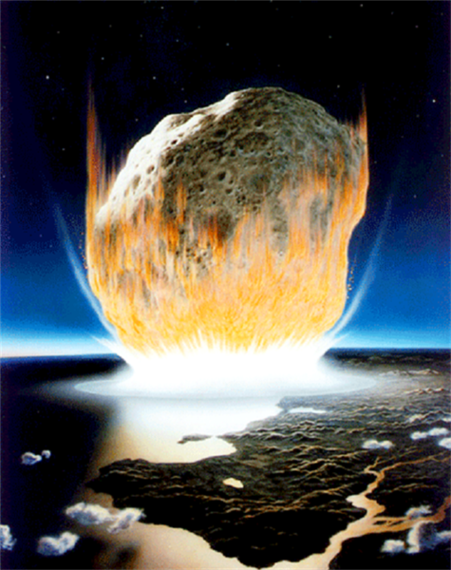By César Buenadicha

César Buenadicha has led programs in social innovation, crowdfunding, social entrepreneurship, micro-franchising, educational loans, and local economic development for the Multilateral Investment Fund. He has a PhD in economics and advanced degrees in law and in economics.
65 million years ago, a dinosaur was eating peacefully--as many generations of dinosaurs had done before--when it noticed a ball of fire in the sky moving toward the Earth. The dinosaur was a bit worried, but as a member of the most successful and longest lasting species of animals back in those times, it didn't think the meteor was a threat to its existence. Meanwhile, a small rat-like animal, one of the first mammals on Earth, ran close to the dinosaur, eating some of its leftovers.
The Fourth Industrial Revolution, like an unexpected meteor, is unleashing innovation in an exponential manner, using digital tools and human creativity to bring humankind to the verge of an era of unprecedented prosperity. However, this digital revolution is also a fundamental challenge to the traditional structures of modern capitalism, changing the dynamics of companies, employees, and asset building.
The world's largest taxi firm, Uber, owns no cars. The world's most popular media company, Facebook, creates no content. The world's most valuable retailer, Alibaba, carries no stock. And the world's largest accommodation provider, Airbnb, owns no property. Something big is going on. --Tom Goodwin
Services such as Uber provide unquestionable benefits for many people, who are able to access lower-cost and better-quality services in a more direct and accountable way. However, it is almost guaranteed that millions of workers will be severely affected by the coming changes, which are altering labor markets forever. So, the critical question is, what can all of us--workers or potential workers--expect from this revolution?
There is some hype about the future of jobs (World Economic Forum, Ford, McKinsey, among many), but to clarify the ideas beyond the endless data projections, let's define three categories that are useful in framing how the changes in the economy and labor markets will affect the future of jobs, income, and assets.
The first category is the "Ninjas," a term popularized by Charles Morris in his 2008 book The Two Trillion Dollar Meltdown. A Ninja is a person who has No Income, No Job and No Assets. The global financial crisis produced an increasing number of people caught in the vicious cycle of no income/job/assets, setting the stage for inequality and exclusion. So far, blue-collar jobs have been more affected by the current wave of technological change--spawning discontent in many societies--but more waves are coming and white-collar jobs will soon be hit. Ninjas will mostly be people excluded by the transition underway, because they don't have the right skills or age, or they are located in the wrong place, or they lack a solid digital social network.
The second category, crucial to understand who we are now and what is at stake, are the "Ojihas": a person with One Job, One main source of Income, and "Heavy" Assets. An average Ojiha probably looks very much like you, with one main employer, one principle source of income, and many personal assets (house, car, personal possessions...) that are accumulating gradually over time. In most advanced countries, full-time jobs are the norm in the labor market, and they support the virtuous cycle that has allowed traditional capitalism to expand.
In parallel with the impact of the meteor in the Cretaceous period, Ojihas are the dinosaurs facing a much faster than expected extinction. Their current overwhelming strength and mastery of the existing ecosystem blinds them from seeing their feet of clay, and the astonishing speed of digital change prevents them from modifying the new digital environment in their favor. Of course, Ojihas will fight back against the change (consider stories from around the world about taxi drivers protesting against Uber), and let's not forget the obvious, that they are people with families who work to earn their bread every day.
The third category, key to visualize the future, is the "Modilals": a person with Multiple Occupations, Diversified Income, and "Light" Assets. Worker with multiple occupations are increasingly common. According to a recent study, more than 53 million Americans are now freelancers, and more important, millennials are freelancing more and are more optimistic about this kind of work. As Zipcar cofounder Robin Chase said: "My father had one job in his lifetime, I will have six jobs in my lifetime, and my children will have six jobs at the same time." Diversifying income means not only multiple occupations, but also taking advantage of new income opportunities that sharing economy models (just think Airbnb) offer to generate additional dollars. Light assets (such as shared cars or shared accommodations) stem from not only the new paradigm of the sharing economy (Rachel Botsman's proposal for "access over ownership") but also from the consumer patterns of millennials and greater concern about responsible use of natural resources.
Like the mammals in the Cretaceous period, Modilals are the species that is meant to conquer and rule the earth, not by being the strongest, but by being the most adaptive to change (Charles Darwin). Modilals are far more adaptive to the needs of the new labor market: multiple occupations means more capacity to learn, connect, and perform alternative tasks; diversified income means more risk tolerance and flexibility; and lighter assets entail new perspectives on sharing vs. owning and on responsible consumption, which make it possible for the Modilals to thrive in this changing environment.
A digital meteor is coming and it is already visible in the sky, threatening the extinction of the existing labor market. We can predict that in the labor market to come, Ojihas will become increasingly rarer, Modilals will become the norm, and Ninjas will struggle to acquire skills that enable them to convert to Modilals. The near future may appear bleak: fights for a limited amount of specialized few jobs, rising inequality, falling income, a decaying workforce that cannot convert to the new environment, and industries dying or facing a tough conversion.
On the other hand, multiple examples prove that the sharing economy can also be a force for good, can support the "better angels of our nature" by generating trust, creativity, and a collaborative vision of work.
So will the digital meteor bring chaos, prosperity, or both to humankind? Carl Rogers, a knowledgeable expert on human nature, once said, "When I look at the world I'm pessimistic, but when I look at people I am optimistic." When I look at the future of jobs, income, and assets, and think of all the Ojihas and Ninjas who will be affected, many days I am fearful and full of doubts. But when I look at the Modilals, their freedom, happiness, and senses of purpose in what they do, I feel optimistic and full of hope.
From the Multilateral Investment Fund Trends blog
